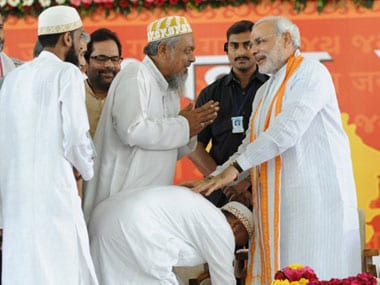Indicative of a strong desire of the government to reach out, Minister for Minority Affairs Mukhtar Abbas Naqvi’s recent announcement about a few new schemes for the educational empowerment of minorities, especially for Muslims, is a positive move. Naqvi’s suggestion to create a link between the madrassa system and university education would certainly help many madrassa students. Similarly, the proposal to provide scholarships such as pre-matric, post-matric and merit-cum-means to more than five crore students from minority communities, including 50 percent girls, also shows that the ministry is serious about the question of Muslim backwardness. [caption id=“attachment_1525233” align=“alignleft” width=“380”]  Narendra Modi with Bohra Muslim community leaders. AFP.[/caption] The reception of these announcements has been quite interesting. The pro-BJP commentators describe them as a reflection of Modi government’s new slogan ‘sab ka vishwas’(Trust of all). It is claimed that the government would tackle Muslim backwardness on purely egalitarian terms to achieve the ‘development for all, and appeasement of none!’ However, there is a political reading of Naqvi’s statement as well. The proposed schemes are seen as a conscious move to assimilate the Muslim voters in what many pro-BJP intellectuals call the mainstream. It is felt that such a move would encourage Muslim voters to think about BJP in a positive manner. These conflicting responses are based on two strong assumptions. First, Naqvi’s announcements are entirely new and they do not have any relationship with post-2014 official policy discourse on minorities. Second, Muslims do not vote for BJP at all and that has been the reason why the party does not rely on Muslims for electoral support. These assumptions stem from the media-driven contemporary public discourse, which has established the fact that BJP and Muslims are two conflicting entities. Naqvi’s statement, on the other hand, is rooted in a policy perspective, which the Ministry of Minority Affairs began to work out immediately after 2014 results. Affirmative Action for Muslims 2014-19 One must remember that the BJP’s 2014 manifesto talked about the Muslim backwardness as an important minority issue. It promised that the party would take concrete initiatives to modernise madrassa, provide protection to Urdu language and streamline the Waqf management. After the electoral victory in 2014, Narendra Modi’s BJP government did not deviate from the established policy discourse on minorities. The Ministry of Minority Affairs under Najma Heptulla recognised the Sachar Commission Report as an important reference point for all its schemes and programmes. The Modi government also published the post-Sachar Evaluation Committee Report (popularly known as Kundu Committee) in September 2014. It is worth noting that the ministry still recognises the 15-Point Programme introduced by the former prime minister Manmohan Singh for the Welfare of Minorities. The ministry also commissioned a study in 2016 to evaluate the impacts of these 15 points on minority communities, especially on Muslims. It does not mean that the BJP simply copied the UPA policy framework. The ‘ Action taken Report’ submitted by the Ministry of Minority Affairs in 2018 rejected a few crucial recommendations of the Sachar Report. For example, the government did not accept the inclusion of Arzal (Dalit) Muslims into the Scheduled Caste list. Similarly, the proposal to create an all India cadre of officers for the State Waqf Boards and Central Waqf Council was also rejected. This revised and selective appropriation of Sachar Report goes well with BJP’s political critique of UPA’s affirmative action framework. BJP has always maintained that the purpose of caste-based-reservation is primarily to reform Hinduism. Evoking this argument, the party rejects inclusions of Muslim and Christian Dalits in the Scheduled Caste category. Yet, the Modi government 2014-19 not only recognised Muslim backwardness, at least on technical grounds but also treated the Sachar Report as a policy source. Muslim vote and BJP Although the BJP establishment has relied heavily on anti-Muslim discourse to nurture its version of nationalism, the party has been able to create effective channels with Muslim communities at least at the constituency level. This strategy has helped the party in two ways. At the discourse level, an impression is created that BJP does not need any Muslim electoral support. This Muslim-Hindu vote binary is employed by the party to consolidate its core Hindutva constituency. Nevertheless, it does not mean that the party ignores the presence of Muslims as voters at all. The informal ‘reach-out’ to Muslims has helped the party to neutralise any counter political mobilisation. CSDS-Lokniti data shows that BJP did not become the first choice for Muslim voters but it has managed to become a serious option for Muslim voters in many Assembly elections that took place in the 2014-19 period. In fact, that is the reason why Muslim vote share of BJP in 2019 remained intact. The policy package announced by the minister, therefore, is an outcome of two processes: a revised policy imagination of Muslim backwardness and a politics of informal reach out. The author is an associate professor, CSDS and Author of Siyasi Muslims: A Story of Political Islams in India.
Although the BJP establishment has relied heavily on anti-Muslim discourse to nurture its version of nationalism, the party has been able to create effective channels with Muslim communities at least at the constituency level.
Advertisement
End of Article


)
)
)
)
)
)
)
)
)



